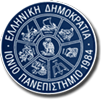Samsun
The consuls

Author: TAN HAKAN
Samsun, located on Black Sea coast, has a long historical background. It was always referred to by this name while under the administration of the Ottoman Empire. Bound to Trabzon for a while in Ottoman administrative division, Samsun became an increasingly important port city on the Black Sea coast, because of the tobacco and several grain products too. Along with the agricultural product potential, Samsun retained a quite spectacular position with its harbor and highway network, making it easier to transport these products to other provisions and countries. Owing to this, the city started to become a trade center on the Black Sea coast.[1]
Samsun became even more important with the advancement of steamboats and their arrival to the Black Sea coast. While the percentage of steamboats coming into the harbor was 87.5% in 1866, it exceeded 95% in 1880.[2] Moreover, shipping in the harbor increased by a large scale. While the number of ships coming into the harbor was 97 in 1841, it reached 580 in 1880. In 1810, it had been 7,364 together with the sailboats that were used for the coastal trade.[3] Samsun, which was under the shadow of Trabzon until 1840, started to rise since that date. By the end of the century, it had surpassed Trabzon in trade values in general.[4]
After the rise of Samsun as a trade center, European countries started to embark on an enterprise to expand their trade actions. Establishing foreign consulates was one of their key efforts. Leading countries in respect to trading at the time started to assign vice-consulars and established consulates in the Black Sea region and more particularly in Samsun.
According to the eleventh clause of the Küçük Kaynarca Antlaşması (1774), Russia had the right to establish consulates and assign vice consulars in the Ottoman Empire boundaries, wherever they wished.[5] By this agreement, they established a consulate in Samsun in 1856.[6] The building of the Russian Consulate was near the Ottoman Government Office in Samsun before moving elsewhere.[7]
After signing Balta Limanı Anlaşması in 1938, England started to found consulates in cities like Samsun where it hadn’t have any consulates before.[8] In the previous century, Samsun, which was of interest to England as an important seaport, was a regional center considered worthy of assigning a vice consular only, bound to the Trabzon consulate.[9] The English Consulate Office was in Kadıköy, where the officers worked full time.[10] Thanks to the consulate founded in Samsun, England both took care of its interests from the trade activities there and also carried out official acts of its citizens.[11] [The office of the English Consulate was in Kadıköy and officers worked full time in that office.][12]
As was the case with the other countries’ merchants, Persian merchants couldn’t ignore Samsun, which played a prominent role after the Crimean War. They were in need of establishing a consulate in Samsun because they had started to trade by using the highway from Samsun to Baghdad. As a result, the Persian Consulate was opened there in 1859.[13] There isn’t any accurate information about the location of the Persian Consulate office, but they had a building named Acem Tekkesi,which was of service to their citizens in Samsun.
Other European countries, realizing the efforts of the leading commercial actors like Russia and England, made their move and began to establish consulates and assign vice consulars in Samsun to make use of Samsun’s trading potential.
In this context, France established a consulate in 1863 after England and Russia. One of the underlying reasons of the French establishing a consulate in Samsun was to make use of Samsun’s growing trade volume, like other countries were already doing. The second reason was Samsun’s tobacco production and France’s trade activities there.[14] Embarking on an expedition for the French steamships was another factor that influenced positively the establishment of the French consulate.[15] Until 1863, France had carried out their citizens’ official acts in Samsun through the English consulate.[16] The French consular office was located in the center of the city. It was very close to the Catholic church and the tobacco factory too.
At the end of the 19th century, Samsun’s commercial power increased significantly and many leading countries like England, Persia, France, Russia, Germany, Greece, Spain, Italy, Romania, Montenegro, Portugal, the U.S.A., Sweden Norway, Austria, Belgium and so on had established consulates in Samsun. Aside from these countries, there were a “Beratlı Hayrriye Tüccarları Consulate” in place in Samsun for the merchants of Muslim countries who were not Ottoman citizens.[17]
[1] M. Yavuz Erler, “The Economy of the Ottoman Black Sea in the XIXth Century”, The Journal of International Social Research, 2:7, Spring 2009, p.121
[2] M.Murat Baskıcı, XIX. Yüzyılda Samsun: İktisadi Değişim ve Yükseliş, Samsun Sempozyumu Bildirileri, 13-16 Ekim 2011, Samsun 2012, p. 491.
[3] p.491
[4] Murat Baskıcı, “XIX. Yüzyılda Trabzon Limanı: Yükseliş ve Gerileyiş”, Ankara Üniversitesi Siyasal Bilgiler Fakültesi Dergisi, C.67. S.3, 2012, p.53
[5] Osman Köse, 1774 Küçük Kaynarca Andlaşması, Türk Tarih Kurumu Basımevi, Ankara 2006, p. 189.
[6] Osman Köse, “19.yüzyılda Samsun’da İran Misyonu: Tüccarlar, Konsolosluk ve Hüseyniyye(Acem) Tekkesi, Tarih Boyunca Karadeniz Ticareti ve Canik Sempozyumu Bildirileri, 19-21 Ekim 2012, Canik Belediyesi Kültür Yayınları, Samsun 2013, p.170
[7] Baki Sarısakal, Bir Kentin Tarihi Samsun, Samsun Araştrmaları-2, Samsun Valiliği Yayını, Samsun 2003, p.317.
[8]Uygur Kocabaşoğlu, Majestelerinin Konsolosları, İngiliz Belgeleriyle Osmanlı İmparatorluğu’ndaki İngiliz Konsolosları (1580-1900), İletişim Yayınları, İstanbul 2004, p.58-59.
[9] Kaya Tuncer Çağlayan, “İngiliz konsolosluk Raporlarına Göre 1841 yılında Samsun ve Çevresinde Ticaret” Geçmişten Geleceğe Samsun Sempozyumu Bildirileri, 4-6 Mayıs 2006, Samsun Büyükşehir Belediyesi Yayınları, Samsun 2006, p.283.
[10] Osman Köse, “19.yüzyılda Samsun’da İran Misyonu…”, p.170.
[11] Baki Sarısakal, p.313.
[12] Baki Sarısakal, p. 313
[13] Osman Köse, “19.yüzyılda Samsun’da İran Misyonu…”p.171.
[14] Özgür yılmaz, “Arşiv Belgelerinde Samsun: Şehirde Fransız Konsolosluğu’nun Kurulması ve Şehrin Durumu” Samsun Sempozyumu Bildirileri, 13-16 Ekim 2011, Samsun 2012, p.677.
[15] Ibid., p.679.
[16] Osman Köse, “19.yüzyılda Samsun’da İran Misyonu…”, p.170
[17] Osman Köse, “19.yüzyılda Samsun’da İran Misyonu…”, p.170
Back




